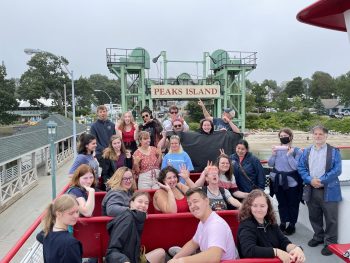Research Learning Experiences (RLEs) invite students to move from being passive to active learners through experiential learning in which they create new knowledge and explore different career paths. In collaboration with business and community leaders, students engage in projects in which they can:
- Learn by doing
- Express themselves artistically
- Contribute to a service initiative, and/or
- Take part in authentic inquiry through project planning, data collection, analysis, and reporting.
UMF incorporates RLEs into the first-year experience by including high impact activities and career exploration in the First Year Seminar, including the First Year Fusion program which offers incoming students to spend a week prior to the Fall Semester engaging course-themed activities across Maine, New England, and even internationally. This early high-impact learning permits the students to develop a strong cohort, build pre-professional networks, and have access to extensive, individualized mentoring.
UMF builds upon the initial RLE foundation with Advanced RLEs that are offered through discipline-specific courses. Advanced RLEs engage students with external partners relevant to professional practice and career exploration, with the intention of building toward internships, practicums, clinicals, or other pre-professional student experiences supported by the Pathways to Careers program.
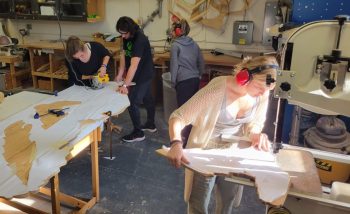
RLEs are supported by a generous donation from the Harold Alfond Foundation as part of UMS TRANSFORMS.
Fall 2024 RLE Courses
First Year RLEs: First Year Fusion

The Good Life
Fusion Week I (Aug 16-22): UMF Campus & Two Nights at Flagstaff Lake
HON 101
Linda Beck
Credits: 3
Course fee: $100
In “The Good Life” seminar, you are invited to set aside time as you begin your undergraduate career at UMF to think about what may be the most important questions in life: What counts as a Good Life? How do I go about living that Good Life? What will be my great work for the good of all? During Fusion week, you will begin the course at a tranquil retreat on Flagstaff Lake run by Maine Huts and Trails. You will stay in cabins along the lake where you can calm your mind, and focus on what really matters. We’ll read inspiring texts that explore The Good Life and have meaningful conversations while spending time in nature, walking the trails, and canoeing the river. Throughout the semester, students will explore their values and visions of The Good Life, articulating it in a final project through a medium of their choosing. Course ends on October 18.
- Spend time at a tranquil retreat on Flagstaff Lake
- Enjoy nature while you contemplate what the Good Life means to you
- Engage in meaningful conversations and develop important connections with classmates as you transition to the UMF community

Sustainability Solutions: Acadia National Park
Fusion Week II (Aug 23-29): UMF Campus & Bar Harbor
FYS 100 Section 7
Matt McCourt
Credits: 3
Course fee: $100
Mainers across the state are working to create positive change in their communities. During our Fusion Week, we will travel to Bar Harbor where we will meet with community leaders who are making a difference and improving people’s lives, in fields as varied as park management, tourism, recreation, and environmental organizing. During the fall term, students will engage in hands-on service learning opportunities that will permit them to work alongside a variety of Mainers who are engaged in creative, transformative projects that are Making Change in Maine.
- Start your college career with camping in Maine’s iconic Acadia National Park
- Meet with community leaders who are making a difference in their communities
- Develop your own creative project that can make a difference
First Year RLEs: Honors First Year Seminar
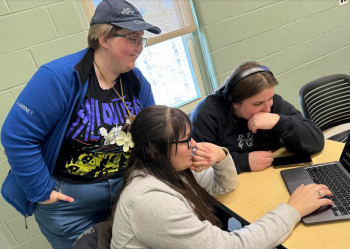
Making Things with Words
HON 101 Section 2
Steve Grandchamp
Credits: 3
What does it mean to publish a written work? In Making Things with Words, students will explore small-scale and creative acts of publishing such as zines and digital films. In this way, the course will introduce students to the principles and practices of creative publication. Working with words and images, students will conceptualize and execute artistic projects. Readings and class discussions will cover the history of the book, the impact of changing technology on the reading experience, and the relationship between form and content across media. A hands-on class, Making Things with Words will provide students with foundational skills in analog and digital design. Experiential learning in the course will include:
- Work with film directors and screenwriters to develop and execute your digital film projects
- Collaboration with a published graphic memoir artist through workshop sessions to improve your skills in visual communication
- Meeting with professional working in the magazine industry in order to explore career pathways related to the course content and projects

Bigfoot
HON 101 Section 1
Luke Kellett
Credits: 3
This course explores the role that Bigfoot plays in American culture while also examining its historical, cross-cultural roots. Much of the course considers how the Bigfoot phenomenon offers a window into the complex relationships between belief, evolution, science, myth and culture. Students will consider the existing evidence for Bigfoot and gain an understanding of those who “hunt,” study, ridicule and celebrate this legendary creature. In a broader context, the course considers why the belief in Bigfoot continues and how it may reflect our own separation from nature and our ancient, wild past. Proposed course activities include:
- A nocturnal search for Bigfoot in a place with historical Bigfoot sightings
- A visit to the Cryptozoology Museum in Portland
- The creation of Bigfoot tracks and silhouette to attract interest in our research survey on Bigfoot beliefs in the UMF community
Advanced RLEs

Fiction Writing
ENG 210
Lewis Robinson
Credits: 3
This class will focus on the craft of writing fiction, and how short prose experiments build into longer narratives. Primary reading will be the work of the contemporary novelist Monica Wood, an internationally heralded writer with ties to central Maine. Monica will meet with us to discuss the development of her work from early drafts to finished work. We will investigate with Ms. Wood the connections between the novelist’s autobiography and her latest novel, How to Read a Book, as well as excerpts from her memoir When We Were The Kennedys. We will travel to Ms. Wood’s home town of Mexico, Maine, to further discuss the inspiration for fiction. Graduates of UMF’s BFA program will discuss with the class their development as writers and the role their education has played in their careers.
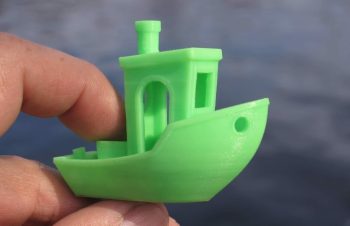
3-D Design and Printing
MAT 177
Dan Jackson
Credits: 3
With a focus on real-world uses and ongoing learning in the technical world of 3D design and printing, MAT 177 will provide you with the knowledge and tools you need for success in a wide range of creative and technical pursuits. We take students on an engaging adventure into the world of 3D design and printing. Here’s what you can expect: Learn the basics using TinkerCAD, and then move on to more advanced skills in Fusion360. You’ll learn how to turn your ideas into digital 3D models and actual physical objects. Participate in real design challenges, including a final project where you’ll create a product that solves a real-world problem. Enjoy guest appearances from industry experts who will present special challenges and offer unique insights into the field. Engage in weekly projects using professional 3D design software. You’ll have the chance to experiment, analyze your results, and think about what you’ve learned. Create a reflective portfolio of your designs to highlight your growth and creativity throughout the course. Work with local CNC experts, present your design portfolio to the UMF community, and connect with community partners on your final project. Learn how to use mathematical principles to improve your designs, reduce waste, and make your designs more effective.
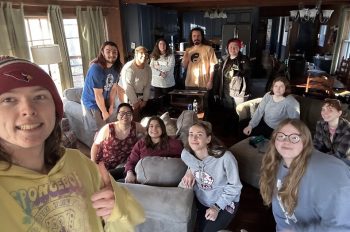
Creativity and Professional Narrative
PSY 284 (Professional Seminar)
Joey Essoe
Credits: 3
In this student-centred, workshop-style course, you will explore the questions of “What’s my story? What do I want to do as a psychologist? How do I become the perfect person to do just that?” Using a fellowship application as a vehicle, you will explore career options and reflect on your future as a psychologist, then learn the technical skills to develop compelling and fundable narratives for your future work.
To prepare you as a well-rounded psychologist, you will also gain experiences in:
- Cultural understanding through World Language & Culture Modules.
- Professional collaboration with your classmates on both practical and academic matters.
- Designing and exercising personal routines for a sustainable career without neglecting self-care.
- Acquiring a preparatory understanding of psychological research, through examining empirical research on the topics relevant to academic success (creativity and self-regulated learning).
- Remaining professional while grappling with uncertainty—the course is designed to be fluid based on students’ academic needs and goals.


